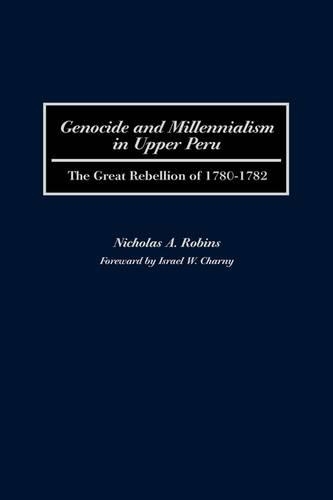
Genocide and Millennialism in Upper Peru: The Great Rebellion of 1780-1782
(Hardback)
Publishing Details
Genocide and Millennialism in Upper Peru: The Great Rebellion of 1780-1782
By (Author) Nicholas Robins
Bloomsbury Publishing PLC
Praeger Publishers Inc
30th May 2002
United States
Classifications
Tertiary Education
Non Fiction
History of the Americas
985.03
Physical Properties
Hardback
280
Description
Spaniards were the target of the chiliastic turned genocidal Indian-led Great Rebellion of 1780-1782 in South America. Exploring one of the least studied genocides in post-conquest South America, Robins calls into question many of the central assumptions currently held by genocide scholars. Victims of genocide usually lack the organization and weaponry to battle their enemies. During the 1780-1782 Great Rebellion in Peru and Upper Peru (now Bolivia), however, the Indian revolutionaries faced the better-organized and armed loyalist army. Whereas genocidal policies are usually characterized by centralized leadership, the Great Rebellion was highly fragmented and confederational in nature, undercutting the widely-held assumption that only the State is capable of committing genocide. The Rebellion is one of the rare cases when the victims of genocide emerged victorious. Focusing on the events occurring in the region south of La Paz, Robins examines how a native millennial movement evolved into an Indian-led attempt at genocide, dealing an unprecedented challenge to Spanish rule in the Americas. In the eyes of the rebels, this revolt fulfilled prophecies of an inevitable, divinely assisted, and long-awaited return of native rule. Just like at the dawn of the colonial period, this new era was to be born of pachacuti, or cataclysm. But this time the Spanish interlopers and their culture would be targeted for destruction.
Reviews
.,."extremely well written, reflecting the exercise of an economy of words, lucidity in style and a cogency of discourse. More importantly, however, the book introduces a new paradigm in conceptualization and as a result is a signal contribution to the field....this work will cause many scholars to reevaluate their definitions of genocide and opens a new frontier in the study of this tragic phenomenon of the human condition."-V.N. Dadrian Zoryan Institute
"Robin's provocations will be read with passion by all the students of Andean rebellions. This book will provoke not only doubts, but also new investigations and that is an honor that only few authors merit."-Jan Szeminski Universidad de Varsovia
.,."exciting and provocative....This work speaks not only to Latin Americanists, but to a wider audience interested in ethnic conflicts. All academic collections."-Choice
...exciting and provocative....This work speaks not only to Latin Americanists, but to a wider audience interested in ethnic conflicts. All academic collections.-Choice
Discusses an indigenous millennialist movement that evolved into an Indian revolt against Spanish rule.-The Chronicle of Higher Education
Nicholas A. Robins has written an engaging account of the massive, Indian-based uprising in Upper Peru or Charcas (what became Bolivia) in 1780-1782....an accessible account of this fascinating period and contributes to our understanding of violence and anticolonialism in the Andes.-American Historical Review
Thorough research, thoughtfully and clearly presented, opens up new territory both in terms of a case study and of the dynamics of genocide....Robins' insights offer an important clue to an understanding of similar phenomena in places like Rwanda, Bosnia or Cambodia.-The ISG Newsletter
..."exciting and provocative....This work speaks not only to Latin Americanists, but to a wider audience interested in ethnic conflicts. All academic collections."-Choice
"Discusses an indigenous millennialist movement that evolved into an Indian revolt against Spanish rule."-The Chronicle of Higher Education
"Thorough research, thoughtfully and clearly presented, opens up new territory both in terms of a case study and of the dynamics of genocide....Robins' insights offer an important clue to an understanding of similar phenomena in places like Rwanda, Bosnia or Cambodia."-The ISG Newsletter
"Nicholas A. Robins has written an engaging account of the massive, Indian-based uprising in Upper Peru or Charcas (what became Bolivia) in 1780-1782....an accessible account of this fascinating period and contributes to our understanding of violence and anticolonialism in the Andes."-American Historical Review
Author Bio
NICHOLAS A. ROBINS is Visiting Scholar at the Center for Latin American and Caribbean Studies, Duke University, and Executive Director of Fundacion Amistad, East Hampton, NY.
